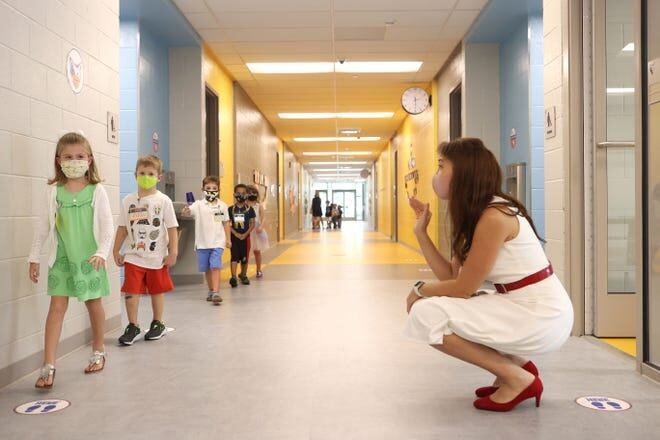Pre-pandemic test data analyzed by national researchers — not recent back-to-school test results from Tennessee students — was the basis for state projections this week that proficiency rates will drop by 50% or more for third-grade reading and math due to schooling disruptions during the pandemic.
The state education department spent much of Thursday and Friday fielding questions from school superintendents, legislators, and journalists asking about the basis for statewide projections that Education Commissioner Schwinn presented Wednesday during a news conference with Gov. Bill Lee.
Schwinn had said her estimates were informed by back-to-school testing data that was voluntarily shared by some Tennessee school districts, combined with national study and analysis by two groups. But asked later for details, members of her staff referred only to “national researchers using historical, Tennessee-specific data.” That data dates from 2014 to 2019, before the coronavirus emerged in the U.S.
“These are estimated predictions. They certainly do not reflect every district in every part of the state,” Schwinn told superintendents on Friday during a conference call. “Many of our students have done exceptionally well, especially those in high-performing bands.”
The revelations brought important context to numbers presented by Schwinn as the governor made his case to get students back into school buildings as soon as possible during the public health crisis. Currently, about half of the state’s 1 million public school students are working remotely, and Lee has been adamant that in-person learning is best to keep children on target or to catch them up.
A significant learning loss was expected nationally as students returned to in-person and virtual classrooms late this summer after school buildings were shuttered in March. The backsliding is expected to disproportionately affect vulnerable populations, such as students of color, those from low-income families, and children with disabilities. But national experts have cautioned against prematurely making pinpoint estimates of student readiness for the new school year.
In Tennessee, school districts have been administering their own diagnostic tests to determine how much their students know. In Memphis, home to the state’s largest district, those assessments happened just this week and the results won’t be back until mid-October.
Numerous superintendents said Schwinn’s comments were misleading in suggesting that recent homegrown data was taken into account in formulating the state’s projections.
“This is about doing your homework,” said Leah Watkins, superintendent of Henry County Schools in West Tennessee. “Before the state releases numbers to millions of Tennesseans, let’s make sure it’s accurate and shared with appropriate context.”
She called the presentation a “gross misrepresentation” that left out important facts.
“It sends a message to the public of gloom and doom — that what we’re doing in our public schools is not adequate,” Watkins said.
Watkins was among dozens of superintendents who complained to Schwinn about the projections, how she framed them, and why she chose to announce them during a news conference before sharing and vetting the data with district leaders. In multiple meetings earlier this week with both superintendents and state legislators, the commissioner did not discuss specifics about learning loss.
“Superintendents don’t need to be surprised by comments coming from our state leaders out of Nashville,” said Dale Lynch, executive director of the state’s superintendents organization. “We just think it’s important that the commissioner and her leadership team know that superintendents are at the point of the spear in their own communities on all things COVID.”
On the conference call with superintendents on Friday, Schwinn apologized for not giving them a heads up. But she did not backpedal on her projections.
“Learning loss data does not reflect the tremendous efforts made by our schools so far this year,” she wrote superintendents in a separate email. “This data makes the case for our continued collective focus and urgency on education in the state.”
Legislative leaders were also taken aback by Schwinn’s midweek announcement, which was shared in a press release by the governor’s office.
Rep. Mark White, who chairs the House Education Committee, said students and their families need careful and consistent messaging from the administration during the public health crisis.
“We know there’s a loss of learning. But before making blanket statements, the state needs to ask superintendents for their data and then look at it closely,” said White, a Republican from Memphis.
Rep. Scott Cepicky, a Republican from Maury County and frequent critic of Schwinn, said the commissioner should have shared her projections with the House Education Committee on Tuesday during a five-hour hearing on reopening schools.
“We just talked Tuesday in committee about her lack of communication. She shook her head and said she’d do better,” he said. “But nobody said a word to us about this pretty big news release coming on Wednesday. It feels like we took one step forward on Tuesday and two steps back on Wednesday.”
Cepicky, who once called for a vote of no confidence in Schwinn but later backed off, said Friday that Schwinn needs to work fast to rebuild trust with lawmakers before the next legislature reconvenes in January.
“This commissioner reports to the governor, but it’s the legislature that makes the laws,” he said. “We can change who people report to. We can require confirmation votes. There’s lots of things we can do.”
The Tennessee analysis was conducted by the Center for Research on Education Outcomes, also known as CREDO and based at Stanford University. It is based on a national study conducted by the education nonprofit NWEA, which makes and sells assessment materials used by many school districts.








